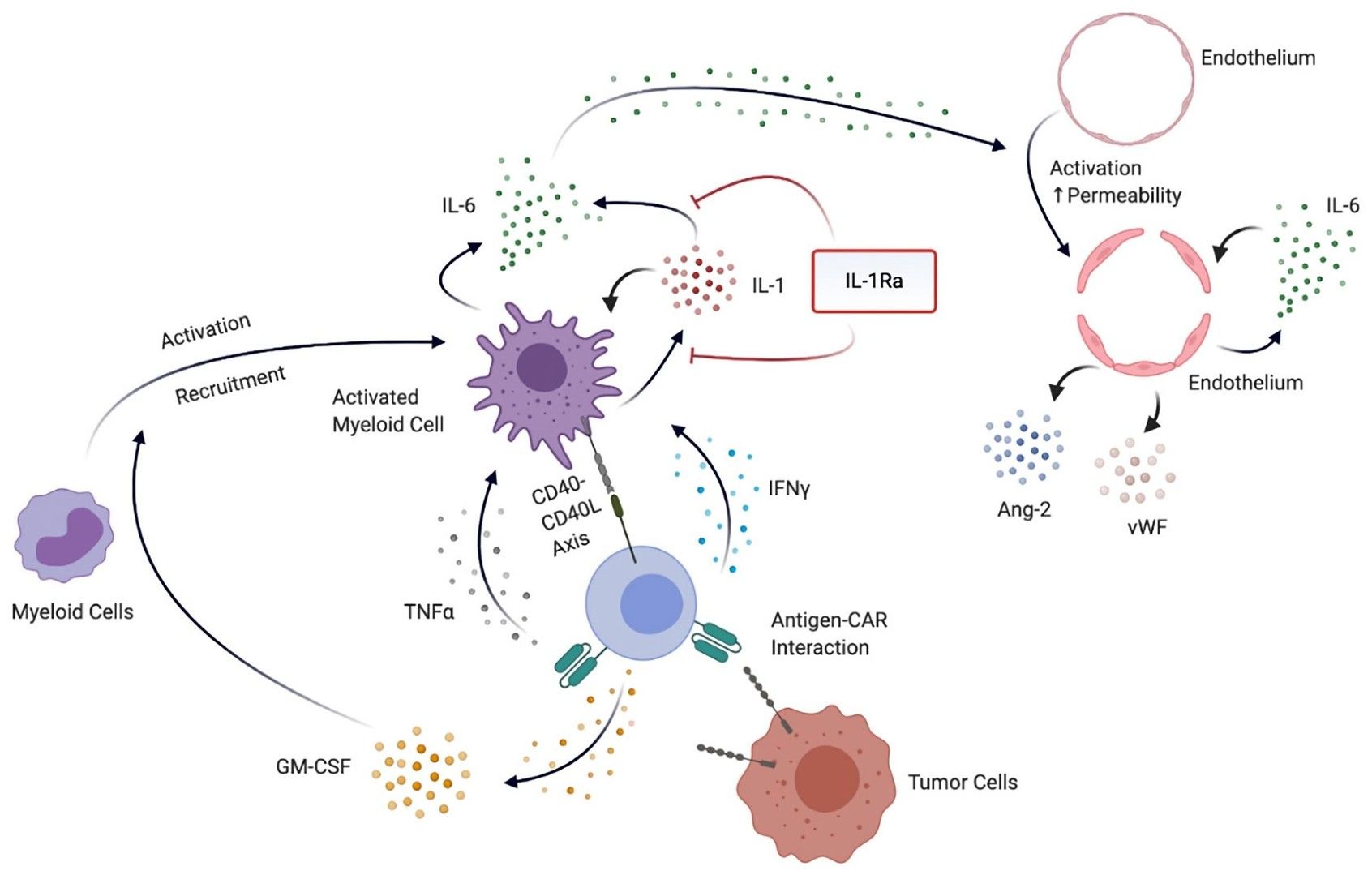At Creative Biolabs, our team is dedicated to working with you to design specific solutions and getting accurate results to facilitate your drug discovery and development programs. Empowered by cutting-edge technology and extensive experiences in T cell-engaging therapies, now we offer drug discovery and development services for IL-1R blockade therapies that can control the cytokine release syndrome (CRS) toxicities caused by T cell-engaging immunotherapies.
Chimeric antigen receptor (CAR) therapy has emerged as an effective treatment for cancers, especially blood cancers. Even though a majority of patients achieve a good response following the infusion of CAR-T therapy, the application of this treatment is limited because CAR-T therapy is frequently related to life-threatening CRS and neurotoxicity. The hallmarks of severe CRS are characterized by high fever, hypotension, respiratory insufficiency, etc. which are related to elevated serum cytokines including IL-1, IL-6, GM-CSF. Studies have demonstrated that the CAR-T induced CRS is mediated by macrophages and it can be ameliorated by IL-1 or IL-6R blockade. These findings indicate that IL-1/IL-1R may be potential therapeutic targets to tackle CRS and neurotoxicity.
Studies have demonstrated that monocyte-derived IL-1 is a major player for CRS and neurotoxicity caused by CAR-T therapy. Moreover, an anti-IL1R antagonist can block the IL-1 function and mitigate the safety issues of CAR-T therapy as an immediately applicable approach. Furthermore, targeting IL-1 doesn't affect CAR-T cell antitumor activity. Based on these findings, IL-1/IL-1R was identified as the cause of CRS and neurotoxicity, and they may enable the development of safer CAR-T cells. At Creative Biolabs, we are dedicated to transferring the basic findings to novel drug development. With extensive experiences in CAR-T cell preclinical services, we are confident in providing excellent drug discovery and development services, and helping our clients to open new avenues to safer CAR-T cell therapies.
 Fig.2 Blocking IL-1/IL-1R to inhibit CRS.1
Fig.2 Blocking IL-1/IL-1R to inhibit CRS.1
As a leading international partner of the scientific research institutes and biopharmaceutical companies, Creative Biolabs has accumulated extensive experiences in antibody drug discovery and development services, CAR-T construction and a series of preclinical services. We are dedicated to helping our clients develop promising drugs to manage the CRS caused by CAR-T therapy. If you are interested in our services, please feel free to contact us.
Reference
For any technical issues or product/service related questions, please leave your information below. Our team will contact you soon.
All products and services are For Research Use Only and CANNOT be used in the treatment or diagnosis of disease.
 NEWSLETTER
NEWSLETTER
The latest newsletter to introduce the latest breaking information, our site updates, field and other scientific news, important events, and insights from industry leaders
LEARN MORE NEWSLETTER NEW SOLUTION
NEW SOLUTION
CellRapeutics™ In Vivo Cell Engineering: One-stop in vivo T/B/NK cell and macrophage engineering services covering vectors construction to function verification.
LEARN MORE SOLUTION NOVEL TECHNOLOGY
NOVEL TECHNOLOGY
Silence™ CAR-T Cell: A novel platform to enhance CAR-T cell immunotherapy by combining RNAi technology to suppress genes that may impede CAR functionality.
LEARN MORE NOVEL TECHNOLOGY NEW SOLUTION
NEW SOLUTION
Canine CAR-T Therapy Development: From early target discovery, CAR design and construction, cell culture, and transfection, to in vitro and in vivo function validation.
LEARN MORE SOLUTION